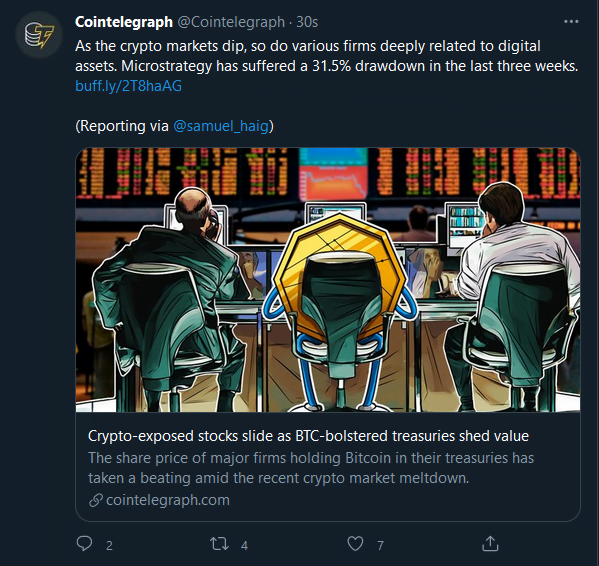As you might know, cryptocurrency and blockchain are the quite a hot topic in the past few years and investments into the industry grow bigger day by day. With high demand, euphoria and sufficient funds, the cryptocurrency market develops and grows at an unprecedented rate, similar to the early evolution of the internet and companies that grew in conjunction with its rise. This unrelenting development is accompanied by unstoppable crypto news that bombards us on social media and other news outlets, which can become even a bit annoying on a nice Saturday evening.
Nevertheless, the news has quite a big impact on the crypto market — prices, trading volumes and public sentiment experience high volatility and some of it can be traced directly back to news and the reaction to it. Many inexperienced crypto traders and investors neglect or interpret the news incorrectly, which causes them to cash out at times where experienced traders recognize good entry points — the exact opposite of what the news might suggest. To guide some of those unlucky souls, I’ve prepared this article which explains how to analyze the news correctly so that it aids your trading decisions instead of infusing you with panic and fear.
Firstly we need to discuss different news channels and sources. There are many options, each has its advantages and disadvantages.

The most obvious one should be Twitter, as it sort of holds a status of the go-to platform for crypto announcements. Its accessibility enables every crypto project team to update their followers on development and announcements easily. Moreover, the format is shaped in such a way that you can only post short messages, which force everyone to post only the concise point of the message without unnecessary flattery. On the downside, because of the accessibility and short messages, twitter feeds can quickly become congested with people trying to get their point across and provide as much information as they can. To avoid this, you can every once in a while unfollow accounts that rarely provide useful and up-to-date information.

The second option that is quite popular are crypto news outlets and platforms that are dedicated to cryptocurrency-based news. Some of the most well-known are Coindesk and Cointelegraph, which post articles about pretty much everything crypto very frequently (sometimes multiple articles per hour). Usually the quality of the articles is quite good, but keep in mind that these platforms exist solely for providing as much crypto news to their followers as they can. If you’re day-trading and trying to profit on small price nuances this could be used to your advantage but if you just want to get the most relevant, course-changing news you might experience a tough time in filtering the additional content.

The third option is quite underrated but I use it pretty much daily when looking for new opportunities and when I want to know everything that’s going on in the market. The sources I’m talking about are old-school news aggregates like Bloomberg, CNBC, yahoo finance and my personal favorite — Investing.com. They represent well established sources that have stood the test of time and usually cover a vast range of news, from tech, traditional finance and business to general economy and crypto development. They pull the content from many different sources and provide a ton of fresh news if that’s what you’re looking for. I personally give a lot of emphasis on checking crypto news on these aggregates multiple times per day because they share news the quickest and twitter posts usually pull their information from these sources. When they reach Twitter, it might as well be too late to make a move and catch an entry point before the market reacts. When general news arrives at twitter, it’s usually already been read by a large number of people that have already made their moves. If you want to stay ahead of the curve and make daily trades, make sure you frequently check a good news aggregate.
If you’re interested in a particular crypto project, you might as well keep an eye on their official project webpages as they usually contain updates and announcements that might boost the price of their token. Keep in mind that their claims might be overblown to generate hype around their project and to lure more potential investors to follow them.
The last two news sources are the ones you should probably avoid if you don’t want to follow the herd of sheep into a slaughterhouse. Sometimes local news will outlets will cover something about some cryptocurrency and most often than not, they’re completely clueless. Additionally, when local news starts talking about cryptocurrencies and similar topics, it’s usually a sign of a bubble or at least an unsupported hype that will likely die out. You should assume the similar when one of your friends starts talking about some random cryptocurrency out of the blue, especially if they don’t understand the fundamentals and only yearn for a quick profit. Avoid acting on news from these sources at all cost because it will only lead you astray — it’s like the blind leading the blind.
The next lesson here is to make sure you understand every bit of the news that you read. If you truly understand all the terms and references, you’ll likely be able to spot news that’s overblown, written just for the sake of writing or is misrepresenting the actual development. Even the slightest misunderstanding of a term in an article might cause you to totally misinterpret the message and act in a manner that will be suboptimal. Therefore you should always take the time to at least check the definition of an unknown term on Google.
After reading the article, you should get an idea of what it’s trying to portray, if it’s good or bad and how impactful the news could be for the market. To make sure the content is factual, truthful and not overblown, you can do two simple preventative actions. First evaluate the source and the author. Nowadays anyone can create a news blog or post something on twitter, so you have to make sure they actually know what they’re talking about. Check their credibility, what they’ve done in the past and on what platforms they’re usually active. Verify their motive for writing the news –try to guess what they gain from it. Sometimes it’s an honest announcement of a project’s development and sometimes it’s an attempt at executing a pump and dump move of a shitcoin (many influencers get paid to hype up some random cryptocurrency to their followers so be wary of people promoting crypto without any experience in it).
Second, you can fact check the claims made in the news. Often authors will create flashy titles for clickbait or enlarge the numbers mentioned in order to make the news look more important than it really is. If what you’ve read wasn’t posted on an official source, they should link to where the official announcement can be viewed or they at least hint to where the author got the information provided in the article. If you cannot find the official source, you can at least compare the news article with a post from another news outlet as it is probably covered elsewhere as well. Always stick to the rules: “if it’s too good to be true, it probably is” and “trust but verify” as they might save you from a bad decision fueled by misinformation.
Besides crypto news, you should also pay attention to regular business and economy news as they sometimes greatly influence the price movement and the capitalization of the entire cryptocurrency market. As directly crypto-related news might creep onto your newsfeed (like Tesla deciding to stop accepting Bitcoin as payment for their vehicles) factors like inflation, regulation and material shortages for producing computer parts might not, yet they will influence the market moves. This might be a bit more difficult to master as you probably won’t notice a correlation between crypto and such news when you first start reading them, but it will get easier with practice and experience. Additionally, the market might sometimes react in the opposite way of what you’d expect. For instance, some thought people will invest their capital into cryptocurrencies at the start of the COVID-19 pandemic as Bitcoin and similar tokens could provide a safe haven if inflation would take place. Instead, Bitcoin and the rest of the cryptocurrency market crashed down together with the stock market because of people panic selling investments and hoarding toilet paper (and similar assets) instead.
Now let’s take a look at how news affects the price of a particular cryptocurrency. In a nutshell, you can observe three events that can take place because of good or bad news. First, there’s a quick reaction of the speculators that were among the first to read the news and have placed their bets (either by buying or selling the tokens), thinking they will be able to profit on the delayed reaction of the rest of the world or that they’ve gotten out of the market before the price makes a proper adjustment. Often, these quick reactions might be totally unjustified as these short term speculations can be based solely on rumors or news that aren’t really impactful (we’ll take a look at this in the next paragraph). If this is the case, the price of the token quickly bounces back to the previous price levels. If the news are actually impactful or course-changing for a particular cryptocurrency, you can often observe the second event; a proper price adjustment (upwards or downwards) that takes days or in some rare cases even weeks to complete. This adjustment unfolds in such fashion because people don’t read the news all at once — the world has to “catch up”. More often than not, traders will also be of different belief on how much this news will affect the price. Because of this disagreement, the price will form a trend but it won’t just directly jump to a settling point. Before it stabilizes at a new level, it may go up and down in price before it discovers the stable price point. The third affect the news has on the market is increasing the trading volume. Every time the public is led to believe they have to make a quick move in order to adjust to the new development, they will generate a big amount of trading volume. When looking back and trying to connect the dots, this spike can easily be traced back to the source of new euphoria or fear and it usually makes the price jump quickly in either direction.
A common mistake crypto newbies make is not differentiating between short-term buzz news and the actual course-changing news that shift the markets for the long term. This is hard to learn and even harder to explain, so I’ll provide some examples for easier comprehension. The only way I can explain to you how to differentiate between the two is to ask yourself this question at the end of the article: “Does this change the usability or functionality of the underlying coin?” Of course, to be able to answer it correctly you must know the unhindered facts behind the news.
Now for some examples, we’ll first take a look at some scammy buzz news that you wouldn’t want to trust:
- In January, there was a rumor of a Bitcoin double spend succeeding, which would create additional unwanted supply. Quite a number of investors were spooked and dumped Bitcoin, fearing it will collapse from this “backdoor”. If they’d fact check the situation, they would figure out that the blockchain actually prevented a double spend by invalidating one of the blocks that have spawned. Some traders quickly realized this misconception and grew their positions at a discount when the rest of the market was fearful.
- Quite a few times there was news that China banned Bitcoin and cryptocurrencies which created multiple price pullbacks. What most of the media failed to explain was that the ban was only covering certain scenarios for battling money laundering and that Chinese individuals can still buy and sell cryptocurrency uninterrupted.
- Jake Paul promoted a few coins on twitter which should raise quite a few red flags. While it’s hard to doubt his success on Vine and Youtube, it’s tough to perceive him as an expert in cryptocurrency. Most likely, he was paid to promote these tokens with his big social media reach. Every time someone promises a way to get rich quick, it’s probably not in your best interest to listen to them.
Now let’s look at some actual course — changing news that enabled cryptocurrency to become more widely accepted:
- Earlier this year quite a few large companies (like Tesla, Square and MicroStrategy) announced they’ve bought Bitcoin in order to diversify their holdings portfolio. This news signals us that Bitcoin has reached the point of such mainstream adaption that companies are willing to invest millions and even billions of dollars into certain cryptocurrencies. Many investors attribute the unforeseen reach of the last bull run to this fact.
- Similarly, many hedge funds and banks like JP Morgan announced they’re preparing actively managed crypto funds to let their clients invest into crypto. While I personally believe it’s way better to directly invest into crypto by buying a token you’re interested in, this move enables older generations that aren’t that tech savvy to dip their toes into at least a portion of those sweet crypto gains. Besides that, it further legitimizes crypto, so it’s hard for someone to rationally claim that crypto is a scam altogether.
- If you paid close attention, the price of a cryptocurrency jumps up every time Coinbase announces they will incorporate it into their exchange. While this doesn’t affect the functionality of the token, it makes it available to a much wider audience as Coinbase is regarded as one of the most popular crypto exchanges that’s very user friendly. Besides that, Coinbase has strict rules and requirements around what cryptocurrency they’ll enable to be traded on their platform. While this makes them offer a smaller range of crypto, their choice is regarded as a sign that those cryptocurrencies have actual useful functionality and good odds of succeeding in the long term.
- You might have herd that Coinbase launched its initial public offering (IPO). While this doesn’t directly affect the price of crypto, it shows that a company that solely does business with cryptocurrencies can be treated seriously enough to be allowed to issue its stocks to retail investors. As more and more of announcements and moves like these come about, crypto becomes more legitimized and regarded as a serious investment option.
Conclusion
To close out this article, I can give you one last advice when handling the crypto news: don’t get too caught up in it. Of course it’s important to be updated with the latest trends and development but you can easily lose your head in trying to figure out what’s the next thing that happened. Personally, I’ve developed this habit of taking a breather once every few hours, perhaps a short walk outside to empty my head and it actually helps me get into “the zone” once I’m back in action. It differs from person to person, so make sure you experiment around to figure out what works for you.







